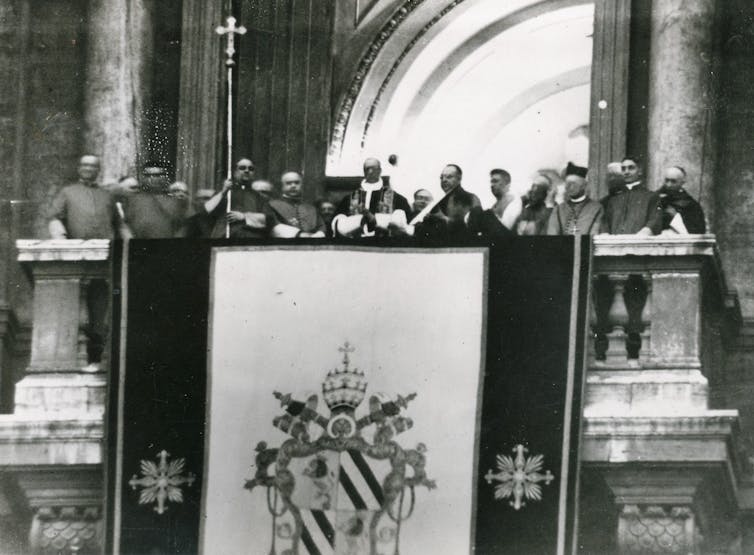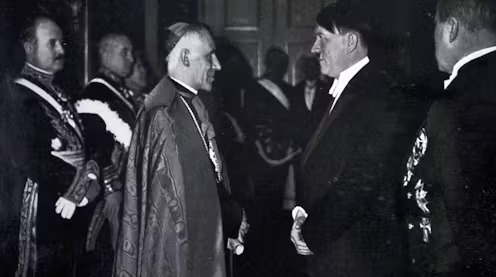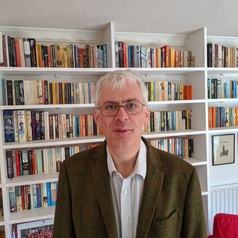Pope Francis has provoked fury by suggesting in a television interview that Ukraine should find “the courage to raise the white flag”. Speaking to the Italian-language Swiss public broadcaster RSI, he added: “When you see that you are defeated … you need to have the courage to negotiate.”
This injudicious comment reminded me instantly of the man once described as Hitler’s Pope. As Pope Pius XII, Eugenio Pacelli led the Catholic Church throughout the second world war. However, while Hitler’s determination to eliminate the Jewish people was brought to his attention, he did not publicly condemn it. Freedom of practice for German Catholics mattered more.
As historian Richard J. Evans reminded us in his essay Why did he not speak out?, when German forces occupied Rome in September 1943, Heinrich Himmler ordered that: “All Jews without regard to nationality, age, sex or condition, must be transferred to Germany and liquidated there.” The roundup took place within sight of the Vatican and Pius XII could not ignore it entirely. He summoned the German ambassador, Ernst von Weizsäcker, to a private meeting and made it plain that he was shocked.
Pope says Ukraine should ‘raise white flag’ and end war with Russia.
To placate His Holiness, the SS released a few Jews who had converted to Catholicism and some who had married Catholics. Of the 1,259 Italian Jews incarcerated in a military college pending deportation, 1,007 were sent to Auschwitz. Pope Pius did not protest. Gratified by his diplomatic silence, Weizsäcker told his masters in Berlin that the leader of Catholicism had “refrained from making any ostentatious remarks on the deportation of the Jews from Rome”.
Though he admired the authoritarian regimes of Franco in Spain and Salazar in Portugal, Pius XII was not pro Nazi. However, he had served as a Papal Nuncio in Germany between 1917 and 1929 and took an interest in the country. He considered National Socialism to be anti Christian and, in 1935, described the Nazis as “miserable plagiarists who dress up old errors with new tinsel”.
‘Catholics will be loyal’
Nevertheless, at his first meeting with Hitler in May 1939, Pope Pius demonstrated that his real ambition was to protect the Catholic church in Germany. He told the German chancellor:
I am certain that if peace between Church and state is restored, everyone will be pleased. The German people are united in their love for the Fatherland. Once we have peace, the Catholics will be loyal. More than anyone else.
Protecting Catholicism would remain Pius XII’s priority when Germany went to war. Historian David Kertzer explains that : “Hitler never intended to restore the prerogatives of the Church in Germany, but he knew how to dangle various enticements.” Nazi diplomats did not have to work too hard to keep the Pope silent on topics that might embarrass Hitler.

Pope Pius XII appears on the balcony at St Peters after his election on March 2 1939. Correio da Manhã Fund, Arquivo Nacional
In October 1941, Harold Tittman, an American diplomat at the Vatican, urged the Pope to condemn Nazi atrocities. Pius XII remained silent. He feared that criticism of Hitler’s regime would provoke harm to German Catholics. In August 1942 Pius XII received a letter from Andrej Septyckj, a Ukrainian Cleric, bearing news of the massacre of 200,000 Jews in Ukraine. He invited Septyckj to “bear adversity with serene patience”.
Pius XII flirted with public criticism of Nazi inhumanity in his 1942 Christmas Eve broadcast. In this, he expressed concern for “thousands of persons who, without fault on their part, sometimes only because of their nationality or race, have been consigned to death or to a slow decline”. He did not identify the victims as Jews. His support for Jewish people was limited to discreet diplomacy.
Evil then and now
Documents in the Vatican archives show that Pius XII received information about the systematic murder of Jews in Poland in September 1942. As I discovered while researching my book, Reporting the Second World War - The Press and the People 1939-1945, he could have learned as much by reading British newspapers. In autumn 1942, titles including The Times and Daily Mail reported the World Jewish Congress’s belief that a million Jews had already died. The Manchester Guardian reported the existence of “a vast system of organised traffic in human beings” in which “the fit may survive for as long as they are useful: the aged and unfit may perish at will”.
Pius XII’s enthusiasm for fascist regimes was motivated by fear of communism. He recognised that national socialism was substantially more brutal. Indeed, he knew that it was murderously antisemitic on an colossal scale. When he could do so without compromising Catholic interests, he sometimes helped Jews. But Pius XII always prioritised defence of Church assets and prerogatives.
Today, his successor might contemplate the damage inflicted on his wartime predecessor’s reputation by his meek collusion with the wrong side. Ukrainian foreign minister Dmytro Kuleba responded caustically to Pope Francis’s crass comments with: “Our flag is a yellow and blue one. This is the flag by which we live, die, and prevail. We shall never raise any other flags”.
In risking the impression that he considers Russia the likely winner of war in Ukraine, the pope might take care not to promote peace at the expense of justice.



 FxWirePro- Major Crypto levels and bias summary
FxWirePro- Major Crypto levels and bias summary 

































